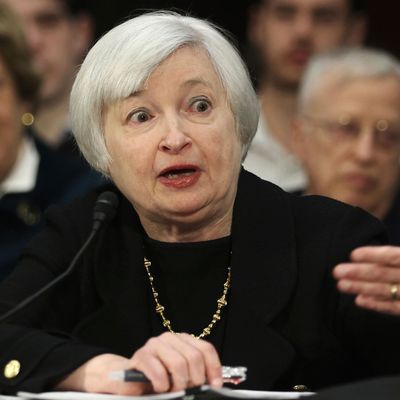
Earlier this month, Federal Reserve Chair Janet Yellen delivered a careful, fact-laden speech about rising economic inequality. This proved so sufficiently alarming to conservatives that even the American Enterprise Institute’s Michael Strain, a moderate, wrote that Yellen is now “in danger of becoming a partisan hack.” Strain has kicked off a debate, hosted in the New York Times today, over Yellen’s apparently shocking breach of decorum.
The most striking thing about Yellen’s remarks is how cautiously she waded into the subject of inequality. Rather than actually state that rising inequality is a problem in American life, she merely conceded that it is “appropriate to ask whether this trend is compatible with values rooted in our nation’s history.” Strain concedes that Yellen withheld a personal opinion about whether the rising gap between rich and poor is good or bad — “even by focusing on income inequality,” he argues, “she has waded into politically choppy waters.”
It is true that inequality is a — more likely the — question the two parties most bitterly contest. Democrats propose domestic policies that would reduce inequality; Republicans propose policies that increase inequality, often to a historically unprecedented degree.
What’s more, the parties don’t merely disagree about the merits of inequality, they disagree about the merits of even acknowledging it. Republicans often deny that inequality is rising, or simply want to keep its existence off the public agenda. Remember Mitt Romney conceding that inequality should only be discussed in “quiet rooms”? So Strain is right about this. Merely by stating facts about inequality in public, even without taking a stand on it, Yellen has placed herself on one side of a partisan divide. It’s like saying “Jehovah.”
What Strain does not mention is that Yellen is hardly alone among Federal Reserve chairs. Her immediate predecessor, Ben Bernanke, steered clear of political debate as best as possible. But his predecessor, Alan Greenspan, had no such compunction. Hardly a week went by without Greenspan interjecting himself into the political debate. And Greenspan, a former follower of Ayn Rand with staunchly conservative views, had none of Yellen’s careful reserve. In 2001, he insisted, insanely, that massive tax cuts were needed lest the federal government completely pay off the federal debt and begin buying up stock, leading to socialism. In 2005, he endorsed President Bush’s idea of privatizing Social Security.
Is the new rule here that, starting now, the Federal Reserve chair has to stay completely out of partisan politics? Or is the rule that they need to stay out of politics unless they’re conservative?






























